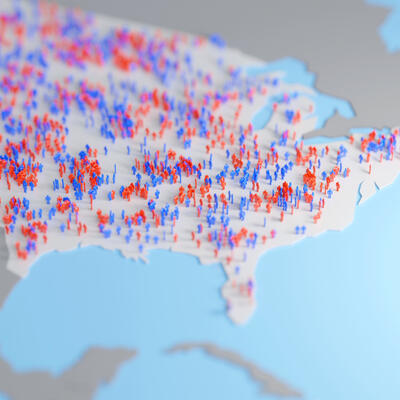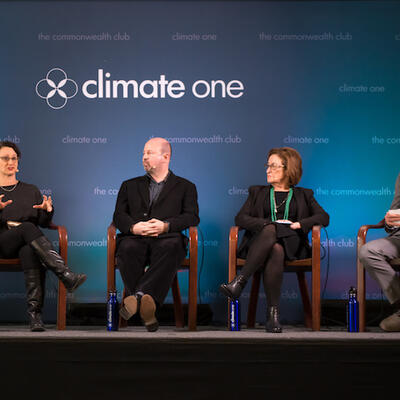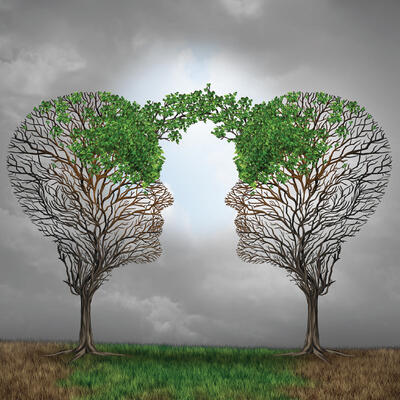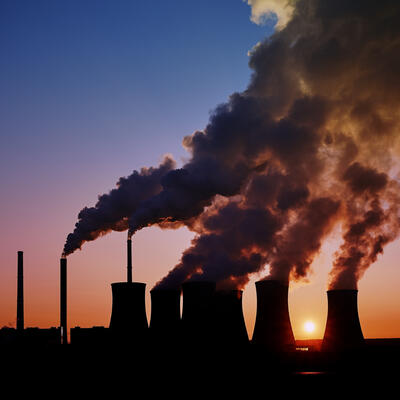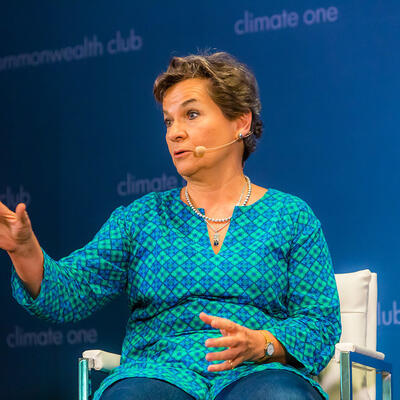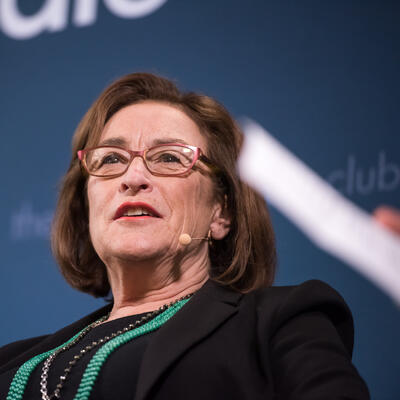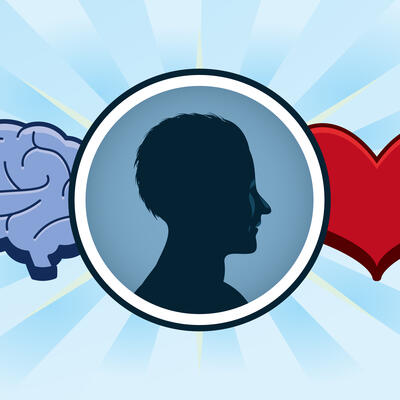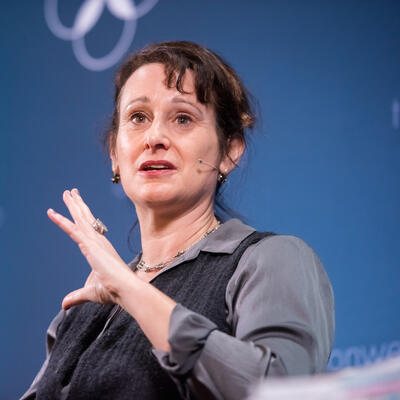
Handling Your Feelings About Climate Change
Guests
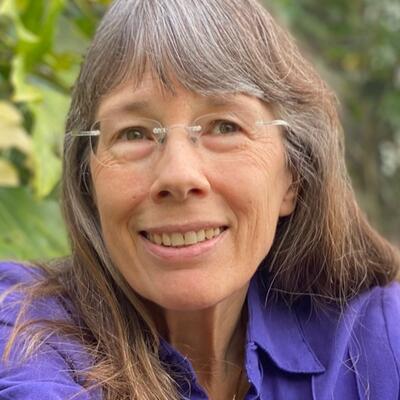
Joan Blades
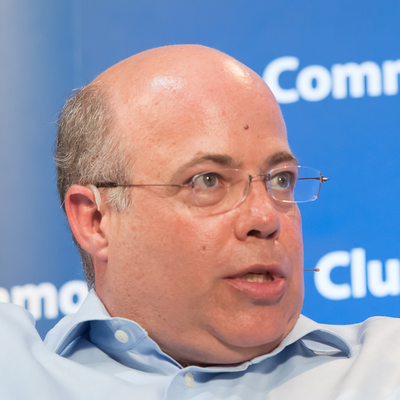
Joshua Freedman
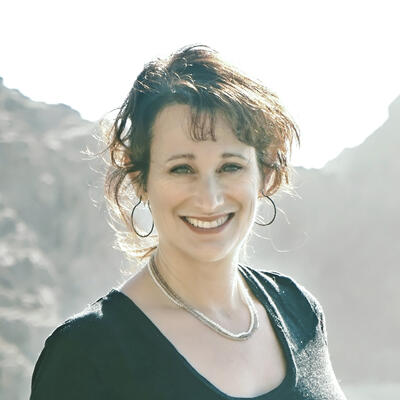
Renee Lertzman
Summary
If climate change makes you feel anxious, depressed or powerless, psychologists say you’re not alone. Can talking it out help drive change?
Joshua Freedman, CEO, Six Seconds; Author, Inside Change: Transforming Your Organization with Emotional Intelligence (Six Seconds, 2010)
Renee Lertzman, Climate Engagement Strategist
Joan Blades, Co-founder, LivingRoomConversations.org
This program was recorded in front of a live audience at the Commonwealth Club of California on January 27, 2016.
Full Transcript
Greg Dalton: Conversations about climate disruption are often grounded in scientific facts and figures. News articles and even Climate One radio shows are littered with kilowatt hours, carbon dioxide levels and other complicated terms. I'm Greg Dalton. On today’s show we’ll explore the emotional side of the journey to build a cleaner economy and protect the climate that supports it.
Fossil fuels are deeply embedded in everything we do and make every day. Changing our economy, our cars, buildings and food systems requires staying power like going on a diet or exercise routine. It's easy to get discouraged along the way and slack off or just give up. Underneath all the hardware and geeky terms, building a sustainable economy is a human and emotional endeavor. Academic research and online stories are capturing this dimension and coining terms such as climate hope, climate depression, climate hysteria, climate anxiety identity and empowerment. This hour, we’ll discuss the psychological dimensions of healing the climate which presents the biggest business and technological opportunities of the century. We’ll include questions from our live audience at the Commonwealth Club in San Francisco. We’re pleased to have with us today three guests. Joan Blades is Co-founder of LivingRoomConversations.org, a values-based dialogue between liberals and conservatives, liberals and conservatives who actually talk to each other. She also co-founded Moms Rising and the political advocacy group MoveOn.org. Joshua Freedman is the CEO of Six Seconds, a nonprofit dedicated to emotional intelligence. He’s a consultant to large corporations and author of the book Inside Change at the Heart of Leadership. Renee Lertzman is a climate strategist and advisor to public and private sector organizations. She's the author of the academic book, Environmental Melancholia: Psychoanalytic Dimensions of Engagement. Please welcome them to Climate One.
[Applause]
Joan Blades, let's begin with you. Did you have a particular moment where there was a climate epiphany, or was it a gradual awakening where you came to realize that climate is something you ought to think about?
Joan Blades: I don't remember a climate epiphany about climate change. I remember gathering concern. And in 2005, I was part of a group called Reuniting America bringing leaders on the right and left together to talk. And I wanted to understand why there seemed to be this growing difference in how people perceive the issue of climate. And I had the opportunity at that point to talk with leadership of the Christian Coalition and Grover Norquist. Yeah, these people -- it wasn't such a firm boundary then and I had some great conversations. Five years later, I realized that I could not have that same conversation and it would not have gone the same places. And that having that human connection can make all the difference in the world and if you hear someone, if you actually -- because once I like you, I hear you in a completely different way. And that was the inspiration for Living Room Conversations, as that boundary about talking about climate became more impenetrable that as human beings we needed to make that human connection and then things would become possible.
Greg Dalton: And we’ll get into that. So it sounds like you’re saying it’s more difficult to talk about climate now even though there’s more evidence and what’s more in the headlines than it was 10 years ago, is that right?
Joan Blades: I believe that is the case, yes.
Greg Dalton: Renee Lertzman, how about you, was it a moment in time or a gradual process?
Renee Lertzman: I would also say that if those -- I think that for me it was my freshman year in college. So I was about 18, 19 years old and I was taking environment studies kind of introduction to environmental studies. And that experience itself was quite profound in part because I was also taking psychology courses. And so that disjuncture that I was experiencing between what I was learning about in the lecture hall was completely sort of disassociated from the whole conversation, you know, all the conversations we are having around human psychology, why are humans the way they are and how do we manage difficult, distressing situations. That combination led me to sort of a singular focus on putting this whole area sort of front and center as far as really understanding and wanting to engage with this issue through that lens.
And then I would also say there are subsequent experiences where I think moments that amplify things for us. So, you know, as I’m hearing people talk I’m thinking about, you know, yes, there was that trip or that direct experience. And I think having that visceral experience is really, it’s really key for a lot of people. I’m just curious do you -- I’m curious how you, do you have a story or how you got into this?
Greg Dalton: In 2006, I was in a different position at the Commonwealth Club and interviewed Elizabeth Kolbert who wrote a book, Field Notes from a Catastrophe. It was the first climate book that I ever read, and it was quite awakening and afterwards we went out to dinner with some people and talked to her. She's a writer for the New Yorker and later wrote the Sixth Extinction. A year later, I had a chance to go on a Commonwealth Club trip to the Arctic and with some scientists from Cal and Smithsonian and elsewhere and Tom Brokaw from NBC News, Forrest Sawyer from ABC News and flew around in helicopters and saw polar bears and walked on the tundra and was steeped daily in the Arctic, wearing my Hawaiian shirt in the Arctic in 2007. I was actually up there when Al Gore did that, you know, Earth 07/07/07 concert. And came back and said “Wow, this is really interesting and this is really scary.” I put together a video, a slideshow I remember, tears streaming down my face, like putting that together what I had seen. And I’ve shared this story many times, but recently for the first time in a recorded sense and after some people heard it, got trolled on Twitter and, you know, attacked for that, which may relate to some things we’re talking about today.
But Joan Blades, I want to pick up on what you talked about the difficulty for having conversations they become polarized and some people who care about climate, self-censor and silence themselves because they don't want to be oh that person who's talking about the end of the world or that or they, you know, I want to pick up where you mentioned there in terms of the difficulty because either the polarization or the climate has become like sex and you don't talk about it in polite conversation.
Joan Blades: Well, I mean, what we’ve seen modeled in the media and with leadership too often, this is very disrespectful way of engaging with each other. And I have friends that say, “Oh yeah, I’m gonna do living room conversations.” And a living room conversation is just two people with different viewpoints each invite two other people, their friends. And we’re more and more homogenous, so that’s generally three and three, to have a conversation about a given topic. And in the case of climate, I actually said well, someone that doesn't believe in climate change isn't going to come to a conversation about climate. So we’ll have conversation about energy. And the lovely thing about that is when you have conversation about energy, you find you have a lot of shared values. You agree that efficiency is a good thing renewables are good thing. And as you get to care about each other, even if some of the people in the room don't personally believe in climate yet because we are living evermore in separate narratives. I read my conservative friends’ literature they send me and I go, oh wow I see why they don't think climate change is such a big deal. If I was reading this on a regular basis I would too. And I have conservative friends that, you know, care more because they care about me. So that relationship piece is just essential. And the living conversations offer a structure that allows for that kind of trust and intimacy to start to have a relationship, to start to find your common ground.
And then I have a great deal of faith that when we discover, you know, these people with very different ideas are actually kind, caring, intelligent, and on both sides we have some misimpressions there, then a great deal more becomes possible.
Greg Dalton: And when someone is a climate skeptic or denier, do you roll your -- what happens when you roll your eyes or say like you idiot.
Joan Blades: People want to talk about climate and they want to tell someone about that doesn't believe; if you roll your eyes you've lost them. And I have conservative friends that have told me stories about, I won’t talk to my, you know, daughter-in-law about climate because she, you know, dismisses me, you know, he feels deeply disrespected by that process. So, you know, the starting place -- that’s why this is a good conversation. The starting place is that emotional connection and once you have that connection then many things become possible.
Greg Dalton: Josh Freedman, how do you talk to people who have very different views or people who have usually have different values, different sets of views on energy, climate et cetera?
Joshua Freedman: Carefully. I have a family member who is very conservative. And when this topic of tonight’s conversation came up, I was thinking about the interactions with him and how I have, like sex and politics, kind of sometimes retreated from, you know, it's Thanksgiving and like oh don't bring that up. But I feel it's so important and I also, I’m kind of interested in his perspective and my solution is similar to Joan’s, my solution has been to make it personal.
I’m not, I mean I am not a climate scientist and, so it's not for me it's not a factual, like I don't have all these facts at my disposal. But last time I saw him, I said wow I just drove down through the Central Valley and it was so dry, I’ve never seen it like that; it really scared me. And so being able to speak from my own experience, I’m not telling him he is wrong. I'm just talking about what I'm seeing and feeling. And I have no idea if that does anything to change his perspective, but I think it's a way for me to assert myself without moving into polarizing conversation.
Greg Dalton: Renee Lertzman, I feel sometimes that even when talking to people who accept climate reality as here and now, that they still don't want to talk about it. They socially that they will talk about it for 30 seconds and then change the subject because maybe because I talk about it like it's a downer, maybe I bring it up the wrong way or they're still like okay, let's talk about something lighter more, hey how about the Super Bowl whatever it is, right? Is that a real consider -- what's going on psychologically there. These are not people who -- these are people who accept it, but still don't want to hold it too closely or too long.
Renee Lertzman: Right. Yeah, I think that it comes back to what is our experience and Joshua's story about how getting in touch with our experience is disarming. But it also for many of us can be very difficult and challenging to know what to do with it and how to manage it. So with regards to how we’re uncomfortable or reticent or unsure about how to relate with this topic, in my experience it really comes down to anxiety and the kinds of anxieties that this topic can bring up for us.
And not even knowing on a conscious level that that’s what’s happening. And so as social beings we’re constantly sort of calibrating and monitoring with one another what's acceptable or not to venture into. And when we’re not getting the cues from others that it's actually, you know, not okay, that we may make someone else uncomfortable or feel threatened, we tend to sort of shut down. And that's why one of the developments that I'm really excited about is this notion of conversation and how do we sort of what I would call “break the taboo” about talking about this in a way that's not touchy-feely, it’s not particularly emotional; it's just very normal and it’s very naturalized. So what does it mean in our workplaces or in our relationships, you just say hey, you know, I feel I just saw something, I am really bummed out about this program I saw or whatever. But just the kind of what we’re always wanting to do is like calm the nervous system down so that we can actually have a conversation and access what we feel and think about this. Because it sort of goes back to this notion that anxiety, kind of makes us dumb and shut down. And so if we think about how can we creatively find ways to disarm, so sharing personal experiences so that it’s not about “and what are you doing about this?”
Joshua Freedman: I think I think there's a real paradox here because I think a lot of us feel this growing sense of urgency. And, you know, we’re reaching this tipping point where there’s -- and the notion that we can at the same time feel urgent and say, you know what, I can't just sit back and wait while at the same time, you know, taking this kind of disarmed stance and like treating this as a neutral topic. It's not a neutral topic, you know, and when we start looking at the choices that we’re making and the seriousness of those choices I think it's really hard to cope with. I think it's really overwhelming. And I don't know about other people, but I'm just overwhelmed with normal life. You know, and like then you wanna add on top of it like oh, is this purchase going to contribute to the destruction of the planet; it just becomes really hard to make it through the day. So I think there's just like a coping mechanism for this just overwhelmed sense is to push to the side.
Greg Dalton: And Renee Lertzman, is that normal and pushing it aside does it get bigger or is that just a normal coping mechanism like we don't go around saying “ I’m gonna die, I’m gonna die, I’m gonna die” right, you put it aside.
Renee Lertzman: Well, we’re designed to manage our distressed precisely in that way by putting aside and sort of this what’s called disavowing or you sort of you’re not denying something but you're choosing to not be in that experience. So it’s --
Renee Lertzman: Yeah. It’s a completely natural, normal response where I'm interested in how do we interrupt that or how do we navigate that. And my, you know, it makes me wonder about what happens when we acknowledge openly, yeah I get that this is overwhelming. I imagine that you're probably feeling X, Y and Z that that in itself that's what good therapist do. They acknowledge, they say, yeah, this is hard and here’s what we’re gonna do or here, you know, here are some options. But the power of acknowledgment I think is an area that is calling for more investigation in how we communicate and how we engage with people. To say “Yeah Josh, I know, it's really overwhelming isn’t it?” It kind of sucks, like who wants to even think about this, this is a drag. And now itself can be quite liberating, it’s like, yeah, you’re right.
Greg Dalton: I believe in the power of Cabernet Sauvignon myself. But, Joan Blades, you talked about some of your liberal friends are hysterical about climate and your conservative friends help calm you down. Tell us how that works.
Joan Blades: Well, I think we’re talking about how there can be a sense of panic when you see the world as you know it, you know, heading in a direction towards not surviving. But, we are deeply affected by our community and my community now includes conservatives. And there's a lot of variety among my conservative community. I have techno-optimists friends that really think that our creativity and technology and business, doing business well, is going to solve this problem. And, you know, I had a really wonderful expert conversation in November with Rod Richardson an expert about a supply side, tax incentive, you know, to reduce taxes on clean energy investments. And think of the billions of dollars that would be invested in and I’m listening and going, that’s really interesting, you know, would progressives be interested in a supply side solution to climate? Then there are my friends that are more on the faith side and really are not persuaded that climate is the problem we think it is. In fact my partner friend Jacob sees how this climate vision is really quite analogous to the End of Days religious perspective.
Greg Dalton: Climate rapture.
Joan Blades: Yeah, rapture, end days, there's a real parallel everybody finds that fascinating.
Joshua Freedman: I just -- going back to the like this sort of techno-optimists perspective. I so like that; it’s so appealing to me. And yet my first reaction to it is that it’s just not, it's just wishful thinking. And so, what's funny to me is that -- I mean last time I was here with you Greg I was the one saying no, we have to stand on the same side of this issue we need to not polarize we need to -- but on the other side I'm thinking we have to also be realistic and we do maybe need some we need some emotional intensity here. At the same time that we’re trying to find common ground but we need, you know, --
Joan Blades: Well, I’ll respond to your polarize issue and my position about living room conversations, is on some level I don't care what right and left choose to talk about. I think we have to be in right relationship with each other if we’re going to solve the climate problem when we get there. Because if we solve the climate problem, try to solve it in adversarial stance throughout we’ll get the equivalent of our healthcare system where, you know, we have succeeded in covering more people but rather than figuring out how to get everybody covered and reduce costs, we've got progressives in a defensive crouch and conservatives on like that --
Joshua Freedman: So when we polarize, when we polarize, we polarize.
Joan Blades: Yeah, we need collaborative -- to solve a problem this complex we are going to have to be agile and collaborative and have everybody's best ideas. And the only way I know to do that is to be working with everybody in the room and listening to them and finding a place where we can create the win-win solutions. And as we come up with solutions we’re not gonna say, here's the solution; it's going to have to be an ongoing developments. So that good relationships is gonna be absolutely essential.
Joshua Freedman: It sounds like it requires a lot of patience; it requires a lot of emotional intelligence.
Greg Dalton: It sounds like Joan Blades running for congress, I don’t know. Renee Lertzman.
Renee Lertzman: I just want to say something about the techno-optimism, that I think it's important to have a radar when that is being related to as the -- when there is not an openness and receptivity to having a conversation about it. That what would be considered psychologically like a manic kind of like this is it, and getting fixated on that as the solution. I think that we can develop the capacity to have a radar for when that is happening, as opposed to being open to yes we need, yes and we need this all. But I find with the fixation on solutions that we tend to be part of what's going on is we’re crowding out any space at all, any oxygen for just simply acknowledging and saying wow, like what is going on and how do I feel about this and what are some ways I can respond to this. If it's that kind of fixation like where there’s no space here for anything except solutions, then that can be really oppressive and I don't think very agile.
Joan Blades: Your comment about space makes me think of Jacob's response to my argument to him. That, you know, if there's a 20% chance that we are destroying the world as we know it for our future generations, it's our responsibility to take care of it. And for him creating the space of some uncertainty that I didn't know climate change is happening and you better believe it too but that it's a risk made it possible for him to consider that risk without reacting to it.
Renee Lertzman: Exactly.
Greg Dalton: And Jacob is your supply side economics friend?
Joan Blades: No, he is my conservative Mormon friend.
Greg Dalton: Okay.
Joan Blades: My supply-side economics friend is Rod Richardson from New York. And my another techno-optimists friend is Ralph Benko from DC, you know, he sent to me these wonderful articles about solutions. And I think Ralph really believes that if we have the whole business community investing deeply in clean energy solutions that will be a profound impact. You know, I think he could be right.
Joshua Freedman: I wonder if it’s almost like in order to influence somebody who disagrees with you, you have to be willing to be wrong yourself. Like if I'm so certain that I know that this is a crisis and I'm talking to somebody who knows it's not a crisis, I'm asking them to change, am I willing to change? And honestly, like am I willing to say well maybe, you know, maybe there isn't really climate change. Like that would be hard for me to really be open.
Joan Blades: It seems like that’s the basis of being collaborative; having innovation is precisely that capacity to be open to being wrong, to be open to not knowing. And my sense is that in short supply right now in the climate space and I think it's related to the anxiety and the fact that the stakes are so incredibly high. So my question is how do we create that conditions that support our capacities to be a bit more open to that uncertainty that paradoxically unlocks our more effective creative capacities than just, we’re not going there, we’re only going to talk about, you know, what I call rah rah environmentalism like where the solutions are and there’s no space. So like I said, that raises the question for me. What does it look like if we have -- if it's not about the hope and despair thing at all, just forget about that, right?
Greg Dalton: There is a fixation on solutions because a lot of people say they’re tired of the doom and gloom. They want something they can do and lot of individuals get overwhelmed. Yeah I know that the glaciers are melting, carbons rising, severe weather, Miami is toast. But what can I do about it that matters, what can I -- my carbon doesn't matter, so therefore what should I do?
Renee Lertzman, you are doing some work in Kensington I believe, you’re trying to do something. And tell us about the emotional and the concrete significance of what you're trying to do; I think it's is a compost thing?
Renee Lertzman: Yeah. So I moved to Kensington recently and I discovered that there's no food waste pickup. And we’re surrounded by municipalities that have this. So I kind of landed in this region. And so I started putting feelers out to ask what's going on here and I found that it's a very complicated political situation. And to say the least if anyone here knows about Kensington. So I was kind of effectively dissuaded from engaging with this at that level. But what I found is that there's a core, sort of a group of people who feel equally strongly about this, that we need to sort of join the rest of, you know, civilization in the Bay Area and start to do --
Greg Dalton: Join their peers --
Renee Lertzman: Exactly.
Greg Dalton: -- create a little peer pressure.
Renee Lertzman: Exactly. And so the plan is to create a collaborative, so it's not that, you know, I'm necessarily leading this, but to just look at what happens when we get a small group of people and explore workarounds, right? And trusting that -- I have infinite trust in human capacity for imagination. And so in a way I’m like the total optimist. I think that when we get together and we really look and focus on problem -solving it’s amazing. But the important piece is creating a space where we can be collaborative and really bring in, right what each of us has to offer.
Greg Dalton: So is it about the compost or is it about the cultural norm and the conversation that you have around the compost? Because some people would say, would measure the carbon and say oh yeah, how much greenhouse gases did you divert, et cetera. It’s about the metric; it’s about the tangible concrete. And then there’s the cultural part about just bringing this out into the open. So which one is it for you?
Renee Lertzman: So that’s a really interesting question because if we get overly focused on the metrics, then we will likely be paralyzed and can devalue, minimize our best efforts. So, Mary Pipher is actually an author and psychologist who wrote about this in a book called The Green Boat, where she chronicles her own experience of getting involved with the climate, local climate project and then it became, you know, kind of statewide and it grew and grew. Now she wasn’t necessarily fixated on, you know, of course it’s about being effective. But what she was also noticing probably because she is a psychologist is the effect it was having on her and everyone who is involved in this process which is really profound and life-changing for a lot of people.
So, it's not to say let's just do something because it makes us feel good. I think it's really important not to reduce it at that level and at the same time not become overly fixated on the exact impact of each and every action we take, because then we will quickly sort of go down. So it’s that both/and way of working and it relates entirely to scale, right? So this is an experiment for me because I've been moving around so much I haven't had the opportunity just land and see what happens in a community. And so this relates to, you know, where we focus our energies and so forth.
Greg Dalton: Renee Lertzman is a climate strategist and adviser. We’re talking about climate psychology at Climate One today. Other guests are Joshua Freedman, CEO of Six Seconds and Joan Blades from Living Room Conversations. I'm Greg Dalton.
And it's now time for our lightning round, yes or no questions to each of our guests. Starting with Joan Blades, Joan, your blood pressure drops when you talk to your conservative friends about climate change, yes or no?
Joan Blades: Yes.
Greg Dalton: Joshua Freedman, many climate conscious people lead high carbon lifestyles and ease their conscience with feel-good gestures such as Teslas and solar panels?
Joshua Freedman: True.
Greg Dalton: Renee Lertzman, you sometimes lose sleep over the disrupted climate?
Renee Lertzman: Yes.
Greg Dalton: Joan Blades, you sometimes lose sleep over the disrupted climate?
Joan Blades: Yes.
Greg Dalton: Joshua Freedman, you sometimes lose sleep over the disrupted climate?
Joshua Freedman: No. Maybe I should.
Greg Dalton: Joan Blades, you have experienced climate joy?
Joan Blades: I don’t know about that.
[Laughter]
Oh yeah, on a sunny day you bet.
Greg Dalton: Actually I would consider a rainy day a great day these days. Joshua Freedman, you’ve experienced climate ecstasy?
Joshua Freedman: Sure.
[Laughter]
Greg Dalton: It’s okay if you say I don’t know what the hell that means.
Joshua Freedman: Yeah, can I say that?
[Laughter]
Greg Dalton: Joan Blades, climate disruption is not your primary concern about the future, yes or no?
Joan Blades: No.
Greg Dalton: It’s not?
Joan Blades: No.
Greg Dalton: Renee Lertzman, even the most ardent climate advocates sometimes deny the fact that climate disruption is here and now?
Renee Lertzman: Yes.
Greg Dalton: Is that healthy and normal?
Renee Lertzman: It’s healthy. I don’t know if it’s normal.
[Laughter]
Greg Dalton: Josh Freedman, corporate America is increasingly comfortable talking about feelings and mindfulness.
Joshua Freedman: Yes.
Greg Dalton: Last one for Renee Lertzman; are more Bay Area people in the gay closet or the climate closet?
[Laughter]
Renee Lertzman: Ummm...
Greg Dalton: That look was precious. That look was worth it right there.
Renee Lertzman: I guess I’d say the climate closet.
Greg Dalton: Probably. Alright, how they do, let’s thank them for the lighting round.
[Applause]
[CLIMATE ONE MINUTE]
Announcer: And now, here’s a Climate One Minute.
Kari Norgaard is a sociologist who studies the ways we distance ourselves from climate change. She says that there are many shades of denial, even among those who understand the danger. And they find ways, in their everyday life, to create a sense that it’s not really real.
Kari Norgaard: Just try bringing up climate change in a conversation and see what happens. This is one of the things that I did. There’s so many different ways that people will change the subject. And why is that? And it’s, you know, people are very, very intelligent and I think we’re very compassionate actually and very concerned. Yet, it’s disturbing to think about and we don’t wanna burden each other with it. We wanna have a nice day, maybe you’re in the middle of trying to do something else. And so we have all these ways that we push it to the side and recreate a sense of reality. The reality that we’ve known for actually for most of many people’s lives, climate change has been part of the reality of what’s happening. But through this, we are actually kind of unable to imagine what is real because we’re creating this safety zone.
Announcer: Kari Norgaard is a sociologist at the University of Oregon, and the author of Living in Denial: Climate Change, Emotions and Everyday Life. She spoke with Climate One in 2015. Now, back to Greg Dalton and his guests at the Commonwealth Club.
[END CLIMATE ONE MINUTE]
Greg Dalton: Renee Lertzman, are there heroes and villains in the climate story?
Renee Lertzman: Umm, gosh. I would have to say yes and no. So I would say no in the sense that we’re accustomed to thinking. You know, I feel very strongly about the fact that fundamentally as humans we are all doing what we believe is right and best for ourselves and our communities and the world. And I recognized that there are forces at play that are dangerous and not conducive to our collective biotic health and well-being. I think that there's a lot of issues with the whole kind of villain/hero narrative. For one thing it’s disempowering because if we focus too much on the heroes and people who are out there kind of getting a lot of the limelight, yes, there is, it’s important to have examples. But at the same time it's very easy for us to look and say well I'm never going to be No-Impact Man. I never gonna be that person who uses this much waste a year.
I never gonna be that and we discount our own kind of what’s our path and what we have to contribute. So in a way I would say we have to completely invert that whole binary of hero and villain to really recognize that fundamentally, each of us has powerful role to play but then it’s up to us to figure out what that is.
Greg Dalton: I think there’s another aspect of villains which is often oil companies are bad, they should change, Republicans should change, other people should change, government should change and that sort of takes the weight, pressure off individual action. These other actors should change.
Renee Lertzman: Well it sort of the voice the fact that we’re all in this together. That we’re all complicit in different levels that we are imbricated; we’re woven into a system where it’s almost impossible to function without contributing to the problem. And guilt and shame around that is the most destructive kind of shutdown to any active engagement. So I think it's really delicate territory actually.
Greg Dalton: Joan Blades, you think that during the struggle for marriage equality that some important things happened there in terms of moving away from villainization, tell us about that.
Joan Blades: I sometimes use that as an analogy for the climate movement because there came a point I was told where making, calling people homophobes and basically making them the enemy was seen as not helpful. And that if you could make people your friends and they might not support gay marriage, they might not oppose it in the same way. And I think with climate you've got some of the same quality of, when you make people that have a different viewpoint friends, they're going to have more interest.
And you may find that as you work together on creating more renewable energy or more efficiency as people act consistently with caring about climate, I give you odds that will move that direction. If I convinced someone that came from a very climate-averse community that climate change was a huge problem and they went back and spoke without reservation about climate they could be shunned. And you know --
Greg Dalton: Cast out from the tribe, which means death.
Joan Blades: Which means death. So there’s a reason why in fact relationship comes first before the facts, facts are really helpful after you have relationship. So this division we have I really believe we have to be healing it on many levels. And that going slow to go fast may be frustrating on some levels, but it's imperative that we do it and we start now.
Greg Dalton: So that sounds like empathy, Josh Freedman.
Joshua Freedman: Well, I just want to go back to the issue that you brought up earlier about people who presumably many of the people here do believe that there is a serious and maybe even extremely serious issue with the climate and what are we doing. And to what degree are we willing to take responsibility for something that's really big and complicated and overwhelming and that we don't know what to do. And given that complexity I think that, you know, one option is to sort of do something that salves your conscience. One option is just to kind of ignore it and, you know, look for some more Cabernet Sauvignon.
But another is somehow like I don't know what to do. So why am I going to make change? and I think one of the things that’s interesting to me is thinking about how does somebody who's open to this idea become somebody who's actually conscious and become somebody who’s making more careful choices.
And what I would suppose is that it has a lot to do with our own sense of purpose and identity. It’s not something we don’t change because we see, well may be in the future sea levels are gonna rise and I don't really know. But do I -- what kind of person do I wanna be? And so I think if we can help ourselves think about the kind of people we want to be and what our own identity is and what our own purpose is, that becomes a catalyst for change as opposed to something outside of us.
Greg Dalton: Well one thing that’s inside -- a lot of the people, they can be a catalyst for change is becoming a parent. So Joan Blades, let's ask you like how suddenly being a parent -- then we’ll get to Renee, you know, being a parent can that change people's connection to the future?
Joan Blades: Well, as a founder of Moms Rising, like yeah it certainly cements your relationship to the future. And I think it does change many people's perspectives. That said, I want to be sensitive to -- there's a lot of non-parents in the world that care and love the world in a very profound way also. It adds an additional very strong bond that takes you into the future. And, you know, the way I look at it, it means even when you have an intractable problem, what looks like an intractable problem, you as a parent and as a person that, you know, wants that future for my child and all children in the planet. I'm there and I will work in whatever way I can. You don't get to give up, it’s not allowed.
Greg Dalton: Joshua Freedman, you opened talking about your children, you know, how others -- is that something you use when you work inside corporations, do you try to appeal to the humanity of corporate executives when you’re doing this work?
Joshua Freedman: Well, Yeah, I mean I think fundamentally we’re all people first. And it's interesting when we go and do leadership training or training corporations about creating change, not necessarily environmental change, but any kind of change. What I find is that where people go first is their personal relationships. And they start thinking, wow I would like to be able to interact with my teenager better. And interestingly, a lot of our corporate clients feel very good about providing those kinds of skills to their employees and to their leaders because they say well, if they’re using it at home it’s gonna help them at work as well. So, I think really just trying to shift our perspective to say, whether we’re talking about in business or whether we’re talking about in climate, we’re people first. And that kind of humanization I think really is a catalyst for change.
Greg Dalton: Renee Lertzman, I talked with some eighth grade students once about climate change. They did quite a sophisticated study of climate. And they came here to Climate One and they presented some of their research and they interviewed me and they had looked into it. These are what, 13-year-old, something like that and they looked at me and I looked at them. They looked at me as a person of knowledge, perhaps authority. And I couldn't tell them how bad I think it is. And I really had to hold back. And I kind of choked up looking at them saying you're looking at me and I'm not gonna tell you what I really think because you’re 13 and I don’t want to scare you. So how should someone talk to children about their future in an honest way, but also not scaring them?
Renee Lertzman: Right, yeah. So, young people, this is a critical question around young people having the cognitive ability to process certain kinds of information, learning about certain issues, but may not have or don't have emotional developmental resources to necessarily know how to process that very effectively. And so that's where that zone of young people like teenagers I think is really critical. It reminds me of what Alliance for Climate Education is doing great work around supporting young people engaging with climate change. And treading that line around, engaging with the sort of the facts, the information, but at the same time --
Joshua Freedman: But is it bad to be scared about this?
Renee Lertzman: I don’t think it is. I mean I went through my crisis when I was young and it mobilized me.
Greg Dalton: But some people say fear is debilitating, paralyzing; that hope is what motivates people.
Renee Lertzman: Mm-hmm, right.
Joshua Freedman: I have said that.
Renee Lertzman: Yeah. I mean, I think that as humans we have incredible capacity to tolerate a huge range and that we don't need to be patronizing around the fact that we only need hope and good news and good stories. What we need and hunger for as humans is authentic connection, authenticity. But I do-- so, your question reminds me of something that Kim Stanley Robinson, the science fiction writer -- I heard him speak in Point Reyes last summer and he beautifully articulated how he relates with these issues with young people around. And it might sound a little, you know, woo-woo or whatever but, you know, he’s basically saying this is your opportunity. This is -- it relates to purpose and it relates to finding our way in the world and that this is your moment. Now the flip side of that is I don't think we want to burden young people with feeling like it's on them to have to solve and sort out our mess.
And that can backfire into complete nihilism and anger and rage. So again I think it goes back to thinking about how can we communicate in a way that is grounded but quite honestly, you don't know what the future is. No one does.
Joshua Freedman: I think a bunch of 13-year-olds looking at an adult who’s not, who’s kind of not telling them how, what they really think, I think that most 13-year-olds, that is gonna reduce their trust. And so I think it's really tricky because I certainly don't want to be all doom and gloom and but I do think that -- like making a more authentic, making more wholehearted conversation and being willing to be honest about our own fear and our own despair, as well as our own joy. Like optimism isn't denying problems, optimism is confronting problems and saying and we’re gonna do everything possible to make it better.
Joan Blades: So now I’m gonna do the parent interjection here. I've seen really different kids and there are kids that could hear it and be great and there are kids that would hear it and it would be really bad.
Joshua Freedman: It’ll be a total meltdown.
Joan Blades: And not knowing those kids, I think, you know, that’s kind of why you did what you did because you don’t know those kids in that way.
Greg Dalton: I erred on the side of being cautious.
Joshua Freedman: Well, I would have been afraid to be honest too. You know, I mean I think I would've been I mean, I’ve talked to a lot of kids, and I'm not may be as honest as I might like to be and sort of sitting here in the cool light of day when I don't have a bunch of kids asking me hard questions. I mean I recognize that I think I probably err on the side of caution.
Greg Dalton: Renee Lertzman, Elizabeth Kubler-Ross wrote On Death and Dying: The Five Stages of Grief. Some people have said is that an analog for dealing with the sixth extinction? The species are, you know, we’re losing so much of nature. Corals will be gone in the lifetime of these teenagers that we’re talking about perhaps if trends continue. There’s this great sense of loss. Is Elizabeth Kubler-Ross and the On Death and Dying: The Five Stages of Grief, is that helpful or is that the wrong way to look at it?
Renee Lertzman: Oh, I actually think it’s not particularly helpful. I think that we’re on the right track in being attracted to that. There’s a lot of issues with the five stages of grief that do not translate very well to this context, including the fact that climate change is not a death, it's not implacable. It's a process, it's episodic, it's ongoing; and so when we treat it as something that you grieve as if, you know, something has died, I don't think that that's a very easy translation. But I do feel that absolutely we need to be bringing in looking at mourning and grief work in the context of our solutions focus in our conversations. I think that that's what I'm observing is there’s a sort of an instinctual or intuitive move in that direction already or else we wouldn’t be having this conversation. But I hasten to be cautious about taking some frameworks that are developed in very different contexts and sort of applying it wholesale to this one.
You know, I think the biggest issue is that a lot of people feel very isolated and are sort of in this private anguish that is heartbreaking to me. And the people I interview, they're just going through a private hell because there’s no one in their lives that they can talk to about this.
Greg Dalton: We’re talking about the psychology of climate change at Climate One with Joan Blades, Co-founder of Living Room Conversations, Joshua Freedman, from Six Seconds an emotional intelligence network and Renee Lertzman, a climate psychologist and strategist and adviser. I’m Greg Dalton. Welcome to Climate One.
Male Participant: Thank you for your words. I’m Gary Malazian. When I talk with my conservative friends, I ask them, if you were in charge of designing the planet would you include fossil fuels in the mix? And that goes to a whole other level and I would like your comment about that.
Greg Dalton: Josh Freedman.
Joshua Freedman: What I love about that question is the invitation to imagination. And I think that one of the things that helps us create change is when we can imagine things differently. When we’re kind of get stuck in a view of the way things are, it's really hard to change. And so question like that that kind of invites people, to say, well, is there a different way to think about this. And that and imagination seems to me like a powerful tool for us for any kind of change.
Greg Dalton: Let’s go to our next audience question at Climate One.
Laura: Hi, my name is Laura. You know, I didn’t expect to be thinking about this, but hearing you talk tonight, I find myself thinking about anger as one of the emotions that comes up when I think about climate change. And I think about maybe the fact that there are various solutions that are already known and yet, you know, the will to implement the solutions appears to be absent or not yet well-formed or something like that. And so, and I was also thinking about when we’re talking about sort of when you approach a conversation and progressives approach a conversation and there's like a level of hysteria there. That underneath that hysteria is a very real kind of anger and I can see how that can be a real barrier to conversation certainly. But there must be ways in which anger can also be tremendously useful, you know, and so I wanted to -- I’d love to hear you all comment on that.
Greg Dalton: Joshua Freedman.
Joshua Freedman: So it's interesting to me how often people describe anger and fear or jealousy as negative feelings and I think it's because they're hard to deal with. But I mean anger is actually this incredibly great fuel for us. It tells us there's a problem, there’s something in my way; that's why we have anger. I want to go over here, there's something in my way. And what anger does is it focuses our attention on the problem and it gives us the energy to move through that problem. I think the challenge is we misdirect the anger. And I say, you know, well I'm angry about this thing over here and so I’m gonna yell at you because you're right here and it's easier to yell at you than to kind of deal with this bigger problem.
So I think the trick is, you know, Aristotle's challenge is to be angry in the right degree with the right person at the right time. Like and use that anger where it's really, really, what is in the way? And if we can use that anger to galvanize our attention and energy we’re more powerful.
Greg Dalton: Let’s go to our next question, welcome to Climate One.
Brad Berman: Thank you. My name is Brad Berman and first I’d like to thank the panelists for their candor with this very important conversation. My question is how will Climate One and the panelists present or given these themes address people of color, of different cultures and of socioeconomic disparities.
Joan Blades: I’ll just, yeah, jump in and say that the research I conducted for my doctoral project was based on in-depth interviews with people of varying socio-economic backgrounds, primarily lower working class.
And the whole premise of the work and what came out of that project is a very strong sense that everyone -- just to be a little simplistic about it, everyone cares deeply. And so, the title the term I use, The Myth of Apathy, is really at the heart of it. It's about recognizing that each one of us has a stake and to be very careful and very mindful around how we, what kind of conclusions we draw around who is engaging, and who isn't, and why. So it's really coming at this from what I feel is needed is a deeply compassionate approach to how we are all grappling and struggling with these with these topics and meeting people where they are.
Greg Dalton: Thank you for that question. Joshua Freedman.
Joshua Freedman: I work all over the world. And I work for a global organization and it's fascinating to talk about emotions in all of these different cultures. And I mean my conclusion is quite similar. You know, it's this universal human language, emotion is universal human language and that what people are worried about and what where people are struggling is very similar everywhere. So I think there's actually tremendous common ground when we can have more honest conversations and not, you know, sort of not begin with the assumptions of difference.
Joan Blades: And then I’ll just end it with Living Room Conversations are an open source project that are up online that people have used in East Africa. And we were actually having a conversation with folks in Minnesota today that are planning a conversation on race. So it's for talking across differences of all kinds.
Greg Dalton: Let’s go to our next question. Welcome.
Ken Worthy: Hi, my name is Ken Worthy and I’m an environmental scholar. I have to deal with the environmental bad news with teaching my college students all the time. And it's very hard, it's not just hard for me but it's hard for them, learning more deeply about not only climate change but mass extinction. The fact that our bodies and landscapes are contaminated with toxic chemicals and all sorts of just bad news. What do you think about the idea of instead of focusing on the bad news when we want to talk to the public, try to come up with a positive vision for the future? And this is really just a shift in emphasis; it’s not that we would ignore the bad news about climate change. It's more that we would focus on that as just a component of a larger picture of building a new different kind of world that solves not only climate change but also addresses all sorts of other environmental problems which are so deeply interconnected just as nature and humanity are interconnected.
Greg Dalton: Josh Freedman, last time you are here, you were with Daniel Goleman who -- author of the Environmental Intelligence and also Ecological Intelligence and Emotional Intelligence. Put it in a very positive frame, that hope is more empowering than fear; he even talked about handprints, positive impact, not footprints which are negative impact.
Joshua Freedman: Yes, so fear is really motivating but it does motivate us to retreat sometimes. And so I think that the notion that if we’re only caught in what’s scary, it's going to be very hard for us to look at the future possibilities. So I wanted to say just thank you for your courage of doing that with the work that you do. And it is hard. And I think you're right that it's important to not only talk about what's hard, but also to talk about the possibilities because that ultimately motivates people to look for what they can do.
Joan Blades: Can I just say something?
Greg Dalton: Sure.
Joan Blades: As long as it’s not engaged as a defense mechanism against feeling what it means to learn about what we’re looking at. I think we need the both/and, but as long as we’re not clinging to let’s get in the hope and get in the positivity because we don’t want to go there. I think as humans, we’re far more resilient and have far more capacity to tolerate difficult and distressing experience along with the aspirational and the problem-solving part of who we are.
Greg Dalton: We have to wrap up. I want to ask of you of a positive constructive specific action you’re gonna take on sustainability, climate something else. Starting with Josh Freedman.
Joshua Freedman: So I just come back to this point about purpose and clarifying for myself, who I want to be in the world. The kind of father I wanna be, the kind of leader I wanna be, the kind of work that I wanna do, and looking at using that vision of myself to motivate my daily action to be more congruent with who I want to be.
Greg Dalton: Joan Blades.
Joan Blades: I am going to continue working as hard as I can to get more of these conversations going because it is a little bit like Sisyphus sometimes convincing people that they want to talk to people with very different viewpoints.
Greg Dalton: Renee Lertzman.
Renee Lertzman: Yeah, I'm gonna continue doing my work supporting front liners, people in the front lines across sectors how to engage, communicate and bring in contributions from practicing psychologists into the mix to create a new kind of climate and a psychological engagement approach.
Greg Dalton: And helping climate scientists who suffer lots of personal attacks. I think that’s a great thing. We have to end it there, I'm Greg Dalton. I’ve been talking about climate science, climate psychology here at Climate One with Joan Blades, Co-founder of Living Room Conversations, Joshua Freedman with Six Seconds, an Emotional Intelligence Network and Renee Lertzman, who’s a climate strategist and advisor. You can join the conversation using our twitter handle @climateone and listen to podcasts at climateone.org. I like to thank our audience here in San Francisco and online. Thank you all for joining us today.
Joan Blades: Thank you.
[Applause]
